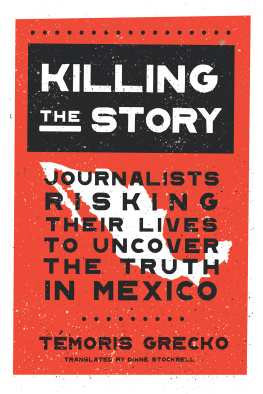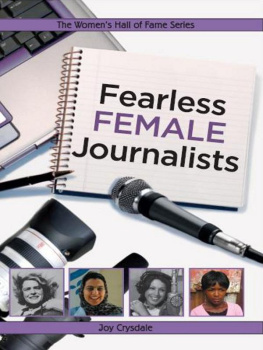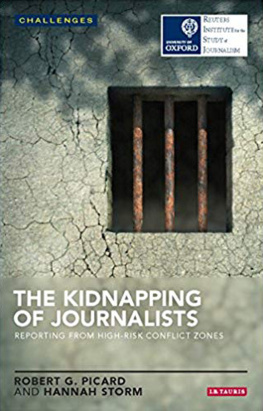Témoris Grecko - Killing the Story: Journalists Risking Their Lives to Uncover the Truth in Mexico
Here you can read online Témoris Grecko - Killing the Story: Journalists Risking Their Lives to Uncover the Truth in Mexico full text of the book (entire story) in english for free. Download pdf and epub, get meaning, cover and reviews about this ebook. year: 2020, publisher: The New Press, genre: Politics. Description of the work, (preface) as well as reviews are available. Best literature library LitArk.com created for fans of good reading and offers a wide selection of genres:
Romance novel
Science fiction
Adventure
Detective
Science
History
Home and family
Prose
Art
Politics
Computer
Non-fiction
Religion
Business
Children
Humor
Choose a favorite category and find really read worthwhile books. Enjoy immersion in the world of imagination, feel the emotions of the characters or learn something new for yourself, make an fascinating discovery.
- Book:Killing the Story: Journalists Risking Their Lives to Uncover the Truth in Mexico
- Author:
- Publisher:The New Press
- Genre:
- Year:2020
- Rating:3 / 5
- Favourites:Add to favourites
- Your mark:
- 60
- 1
- 2
- 3
- 4
- 5
Killing the Story: Journalists Risking Their Lives to Uncover the Truth in Mexico: summary, description and annotation
We offer to read an annotation, description, summary or preface (depends on what the author of the book "Killing the Story: Journalists Risking Their Lives to Uncover the Truth in Mexico" wrote himself). If you haven't found the necessary information about the book — write in the comments, we will try to find it.
Témoris Grecko: author's other books
Who wrote Killing the Story: Journalists Risking Their Lives to Uncover the Truth in Mexico? Find out the surname, the name of the author of the book and a list of all author's works by series.
Killing the Story: Journalists Risking Their Lives to Uncover the Truth in Mexico — read online for free the complete book (whole text) full work
Below is the text of the book, divided by pages. System saving the place of the last page read, allows you to conveniently read the book "Killing the Story: Journalists Risking Their Lives to Uncover the Truth in Mexico" online for free, without having to search again every time where you left off. Put a bookmark, and you can go to the page where you finished reading at any time.
Font size:
Interval:
Bookmark:

KILLING THE STORY
KILLING THE STORY
JOURNALISTS RISKING THEIR LIVES TO UNCOVER THE TRUTH IN MEXICO
TMORIS GRECKO
Translated from the Spanish by Diane Stockwell

Journalism is an insatiable passion that can only be digested and humanized by its brutal confrontation with reality. No one who hasnt suffered it can imagine that servitude that feeds on the unexpected occurrences in life. No one who hasnt lived it can even conceive the supernatural beating of the heart produced by news, the orgasm of having an exclusive, the moral demolition of failure. No one who wasnt born for this and is willing to live only for this could persist in an occupation that is so incomprehensible and voracious, with an oeuvre that is over after every news item, as if it were going to last forever, but that doesnt allow for a moment of peace while it starts all over again, with more ardor than ever in the next minute.
Gabriel Garca Mrquez
I believe that to do journalism, first of all, you have to be a good man, a good woman: a good human being. Bad people cannot be good journalists. If you are a good person, you can try to understand others, their intentions, their faith, their interests, their problems, their tragedies. And become, immediately, from the first moment, a part of their destiny. This quality is known as empathy in psychology. Through empathy, you can understand the character of the speaker and share in a natural, sincere way the fate and the problems of others.
Ryszard Kapuciski
We shall not cease from exploration
And the end of all our exploring
Will be to arrive where we started
And know the place for the first time.
T.S. Eliot
CONTENTS
INTRODUCTION
August 1, 2015. That night, we gathered at a colleagues home. Five bodies had been found, murdered execution-style in an apartment in the Narvarte neighborhood of Mexico City. One of them had been a fellow journalist, another a social justice activist. Both had recently fled to the nations capital in search of safety and were now dead. Our nerves were shattered. Some wept. Not only did anger and sorrow fill the room, but also something approaching panic. We were journalistsreporters, photographers, writers, defenders of the freedom of speechand we were being murdered. Not even Mexico City could protect usnot our friends, not the organizations launched to support us, nor the Federal Mechanism for the Protection of Human Rights Defenders and Journalists, which had been set up by the government to shield us from the violence. In Mexico, its not the law that has the long arm but corruption, which operates in the streets and in government offices and executive suites across the country, and it is claiming countless lives across the country.
Everything suggested that the mastermind behind the crime came from outside of the capitalfrom the state the victims had fled. It was one thing for politicians and their criminal associates to carry out their vendettas in places where the police and prosecutors were in their pay, where protest was quickly silenced. But this was different. We had no doubt that the mayor of Mexico City, Miguel ngel Mancera, and his staff were corrupt, but not so corrupt they would let themselves be dragged down so low and let him off. They would heed the call for justice or, at the very least, avoid being smeared with other peoples shit. Wouldnt they want it known in the nations capital that they were the ones in charge, that outsiders could not just come in and do whatever they pleased on their turf?
I wanted to believe that the perpetrator of the crime would be held accountable. I wasnt alone. Some of my colleagues told us we were nave. Territory meant nothing, they said; in our country impunity reigns supreme. Was this just cynicism that made them say this? I was convinced they were wrong. There was much that was wrong with Mexico, my home, but it was nothing like the failed states I had seen as a reporter: Libya, for instance, or Syria, or Somalia. We had not come to that. Or was I wrong?
We were now all in danger. The city had ceased to be a refuge. It was no longer the beacon of freedom that it had been. The message was very clear: none of us were safe. None of us could evade them when they decided to come for us. There was no one to protect us.
I had flown back to Mexico a year earlier for what I thought would be the usual few weeks. The visits home were inevitably short. Every time I returned, it wasnt long before I would feel the tug of far-off corners of the world and return to my nomadic life as a journalist. But, once away from Mexico, I wanted the wonderful food, the music, the mezcal. I wanted to immerse myself in the warm conviviality of my people, their sense of humor, their love of color. I wanted the privilege that most foreign journalists have to take refuge at home from the horrors of war. At the worst times, when bombs were falling around us in Gaza or Libya, even when two of my journalist colleagues and I were taken captive in Syria, I trusted I would get out of there and return to my country. For the almost fourteen years Id worked as a reporter in some of the most war-torn areas of the world, I believed in that fantasyI need to. But, as it turned out, it was the privilege of journalists from a different sort than Mexico. Once back in my country, I found myself back in a conflict zone.
My country was being torn apart by violence. Thousands were losing their lives each years. In his documentary Which Way Is the Front Line from Here? American journalist Sebastian Junger says, The ultimate truth about war is not that you might die. The ultimate truth about war is that you are guaranteed to lose your brothers. Journalist brothers, he meant. But to us in Mexico, it wasnt only about the professionals who understood the risks they were taking. It was about people you loved who had no choice but to face death where they livefamily, friends, former classmates. In this conflict, there was no use looking for a front line. It was not over here; it wasnt over there; it was everywhere in the vast area of 770,000 square miles where we all lived. There were no clearly identifiable sides, and it was rare that you could clearly identify an enemythey could be a coworker, or someone walking alongside you on the street; they could run a giant corporation or smile at us from a seat in Congress. And the justice system wasnt geared to dealing with the crisis. Because of corruption and the sheer number of cases it had to deal with, nearly 90 percent of murders do not result in a conviction, according to Mexican organization Zero Impunity.
It wasnt until the murders in Narvarte in July 2015 that I truly understood I was going to be in Mexico for much longer than Id anticipated. Now was the time to stay and confirm my commitment to my country and to my journalist colleagues who were being murdered for following their calling. But looking back, I may have subconsciously decided earlier, as early as my most recent return a year before, in August 2014, which roughly coincided with two of the most notorious massacres in recent history. Both incidents showed the brutality, the corruption, and the impunity of the authorities involved at their worst.
On June 30, 2014, seven weeks before I returned, the Mexican Army reported a confrontation in the small town of Tlatlaya in Mexico State, which surrounds Mexico City, between a squadron of eight soldiers and a group of twenty-two supposed
Next pageFont size:
Interval:
Bookmark:
Similar books «Killing the Story: Journalists Risking Their Lives to Uncover the Truth in Mexico»
Look at similar books to Killing the Story: Journalists Risking Their Lives to Uncover the Truth in Mexico. We have selected literature similar in name and meaning in the hope of providing readers with more options to find new, interesting, not yet read works.
Discussion, reviews of the book Killing the Story: Journalists Risking Their Lives to Uncover the Truth in Mexico and just readers' own opinions. Leave your comments, write what you think about the work, its meaning or the main characters. Specify what exactly you liked and what you didn't like, and why you think so.







